Astronaut Suni Williams: You need to make peace before leaving Earth
- Published
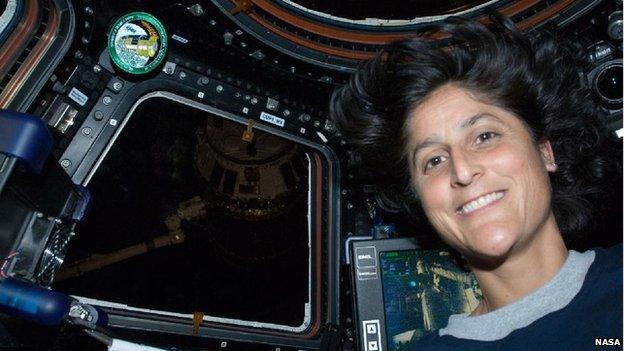
US astronaut Sunita Williams spent a total of 322 days in space on two missions to the International Space Station. As part of BBC News' How to put a human on Mars coverage she explains how she coped and considers whether a crew could endure a voyage to the Red Planet.
"When you are thinking about going away for a long duration mission, it has to be part of your mindset that you're leaving your family, but it's for the right reasons, for good reasons, and hopefully helping humanity.
So you settle yourself on that but you also have to prepare yourself. I call it tying up the ends of your life before you go because you never know what's going to happen.
You want to make sure that when you leave, you feel at peace with everything.
My first mission was six-and-a-half months. We weren't exactly sure how long it was going to be because I went up and back on the space shuttle which was dependent on weather for launch and landing.
So you might have to say goodbye a couple of times and you might get excited to come home and then have to wait.
It was an emotional rollercoaster, particularly because it was my first space flight.
Keepsakes
In space you need to stay as "usual" as possible. On the space station I would brush my hair every day.
I'm not sure it made my hair look any better but it was one of those things that you do that you usually do on Earth so it keeps you normal.
We take things to remind us of home. I think my favourite is a stuffed dog that was homemade from a picture of my little Jack Russell terrier.
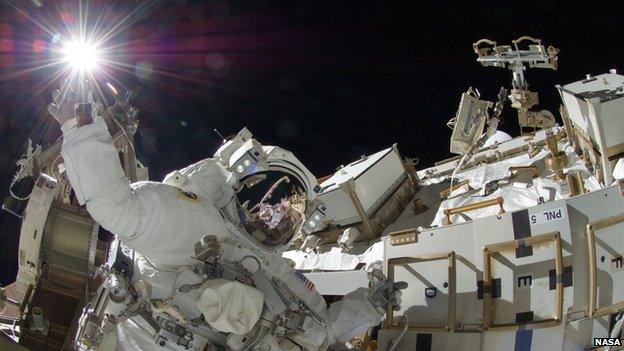
Williams and Japanese astronaut Aki Hoshide (visible in the reflection of Williams' helmet visor), performed a six-and-a-half-hour space walk in September 2012.
Food is really important and I was sent marshmallow crème to make my childhood favourite "Fluffernutter" sandwiches on a tortilla with peanut butter.
Other favourite food reminded me of home - dried cranberries and even canned lobster, Slovenian sausages on my mother's side of my family, and Indian samosas on my father's side.
We try to keep to a regular day because there have been studies which found that even a half-hour change to the normal 24-hour cycle starts to mess people up a little bit.
We have sleep stations where you just close the door and it's dark and quieter. You can hear alarms in case something bad happens but it's generally pretty quiet.
We turn the lights off except for a couple of "night lights" over the toilet so that folks will know where they're going.
Most people have a little bit less sleep, there is always a feeling of nervousness, just because you're in a different environment and subconsciously you're always on edge a little bit.
Spacewalks
From the technical side you need to know that you can live in a small space with people.
There are a lot of training tools on Earth that help you do that, including the Aquarius unit, external [off the Florida Keys] where I was underwater for nine or 10 days. That is a good test to see how you like living in a "can".
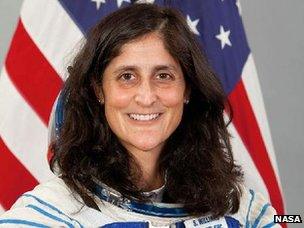
But you also work on your own awareness of yourself in terms of leadership and followership and how you get along with people; particularly if you have difference of culture or difference of ideas.
On my second mission, I was part of a crew of three and I trained with them for about a year-and-a-half, getting to know each other.
That knowledge is important. When we were up on the space station, Aki Hoshide and I were out doing a spacewalk and we had a little difficulty with one of the electrical boxes, external.
Yuri Malenchenko, who we trained with for our Soyuz crew, and Joe Acaba, who we overlapped with on a different crew, were right there to help us out.
They knew when we were getting tired, when we weren't getting tired, when to say something encouraging, when to make a joke, when to be serious.
The team comes together and if you saw the latest spacewalk [in which liquid leaked into Luca Parmitano's helmet] you will have seen the same thing: you do training together and then, when things get a little bit rough, everybody wants to help each other out.
That's a natural progression of getting to know each other and knowing that you're going to rely on the other guy to save your life.
Homesickness
When you're flying in space some of the things down on Earth seem trivial. Things like politics leave your mind. I didn't feel like I was a person from the United States, I felt like I was lucky enough to be a person from Earth.
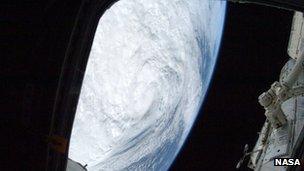
Williams captured an image of Storm Sandy over the US
For me, [most] news wasn't important but people are important, so when you hear about natural disasters like hurricanes and fires, that makes you miss home and wonder how everybody's coping.
But I would also look back at the planet and think "gosh it's a pretty little place, everybody's going for a walk on the beach or something like that, they must be enjoying life down there".
If you are having a bad day, you can go to the cupola window and see a part of the Earth. It makes you smile.
Likewise, when you have communication ability, you can call home and just say "hi" and hear another friendly voice.
Mission to Mars
I can imagine the vehicle going to Mars is going to be a little bit smaller, they probably won't be doing as many science experiments on the way.
The programme is going to have to find things to occupy the crew's time as the Earth is getting smaller and smaller outside the window and the communications delay is getting longer and longer.
Nasa astronaut Sunita Williams talks about training for her 2006 trip to the International Space Station
Mentally, it will be more challenging but I think the reward is huge. So if folks keep the goal in mind then I think it will be do-able. But I don't doubt it will also be psychologically difficult.
Radiation threat
There are a lot of medical issues that we need to solve before we put somebody on a trip to Mars, far away from low-Earth orbit, far away from the protection of even the little bit of atmosphere that's near the planet, that's protecting us from radiation.
We want people to go there and be successful. Robots going there is great but putting somebody's two eyes on the problem where they can make a decision and really understand what is out there is the next step.
We will eventually figure out and solve all the engineering problems, I have no doubt in my mind.
Even though people think the space programme has been running a long time, it's only really been 50-60 years.
It's an incredible step from when we were first just trying to launch rockets to now living and working in space and doing spacewalks on a regular basis.
If there was a definitive goal that specified: "We are going to Mars and how do we do that?" I think that you would see a lot of people sign up. I would go for sure.
Interview by Christine Jeavans
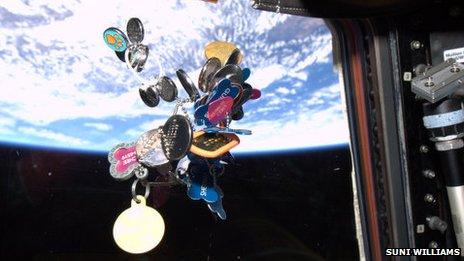
Williams' keepsakes from home included tags to remind her of her dog Gorby
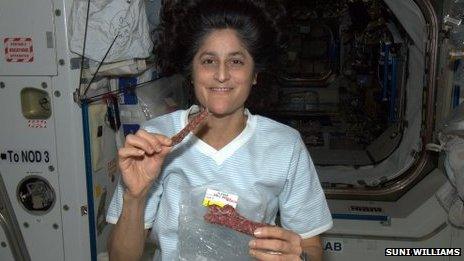
She also took favourite food, including Slovenian sausage...
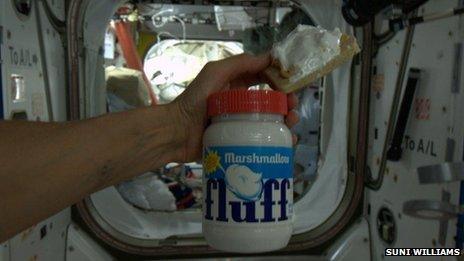
... and ingredients for her favourite childhood sandwich
- Published6 April 2011